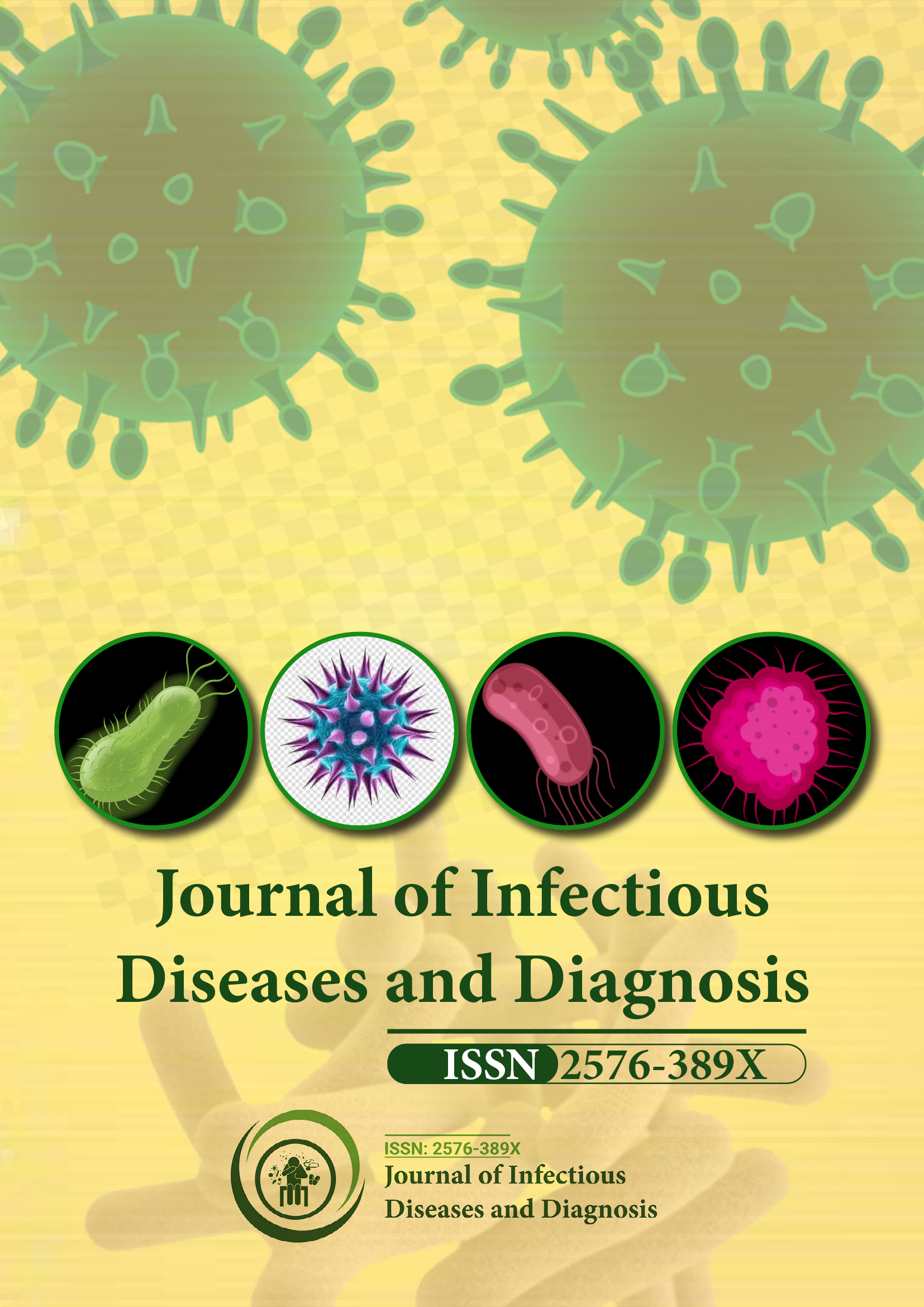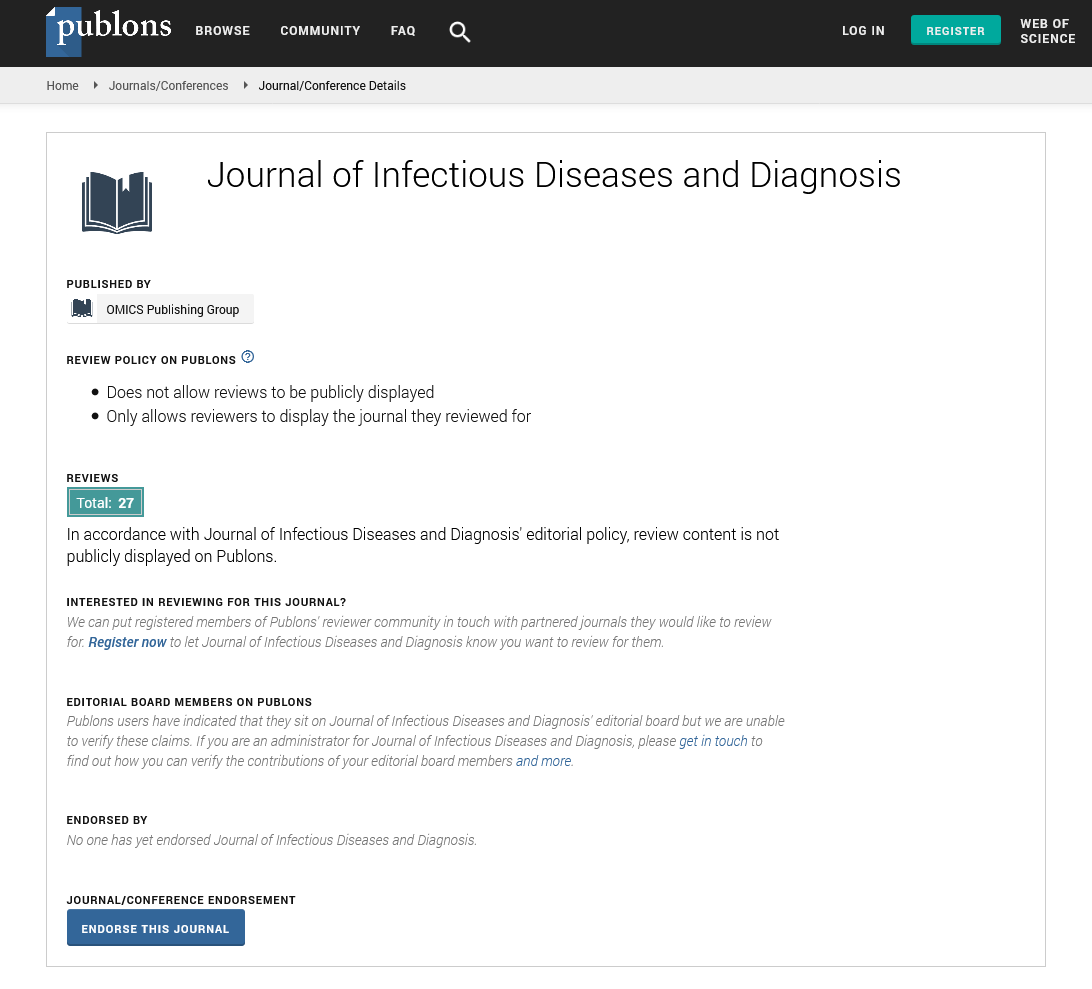Indexed In
- RefSeek
- Hamdard University
- EBSCO A-Z
- Publons
- Euro Pub
- Google Scholar
Useful Links
Share This Page
Journal Flyer

Open Access Journals
- Agri and Aquaculture
- Biochemistry
- Bioinformatics & Systems Biology
- Business & Management
- Chemistry
- Clinical Sciences
- Engineering
- Food & Nutrition
- General Science
- Genetics & Molecular Biology
- Immunology & Microbiology
- Medical Sciences
- Neuroscience & Psychology
- Nursing & Health Care
- Pharmaceutical Sciences
Perspective - (2022) Volume 7, Issue 6
The Multimodal Approach for the Management of Infectious Disease in a Global Context
Zhang Shenli*Received: 02-Nov-2022, Manuscript No. JIDD-22-19288; Editor assigned: 04-Nov-2022, Pre QC No. JIDD-22-19288 (PQ); Reviewed: 22-Nov-2022, QC No. JIDD-22-19288; Revised: 29-Nov-2022, Manuscript No. JIDD-22-19288 (R); Published: 02-Dec-2022, DOI: 10.35248/2576-389X.22.07.190
About the Study
There is a heavy cost placed on the world by infectious illnesses, both existing and new. For the intricate web of interconnected biological, public health, and economic systems to be successfully managed, infectious illnesses demand a lot of work and a multidisciplinary approach. Operational research may improve health systems and enhance decision-making at all levels of disease control through a variety of problem-solving strategies and computational methodologies. This paper highlights opportunities for operational research to contribute to effective and efficient infectious disease management and improved health outcomes, including improved understanding of disease biology, intervention planning and implementation, assessing the economic viability of new strategies, identifying opportunities for cost reductions in routine processes, and informing health policy.
Infectious diseases were only recently viewed as a minor danger to world health due to advancements in cleanliness and health. As recent outbreaks of Ebola and the coronavirus disease (COVID-2019) and the expansion of HIV, TB, and malaria demonstrate, infectious illnesses continue to be a threat to human health and mortality. Even while many infectious diseases are preventable and treated, they still constitute a serious health risk, particularly in places with little resources. Compared to 7% in high-income countries, infectious diseases, disorders that arise during pregnancy and childbirth, and dietary deficiencies accounted for more than 50% of all deaths in lowincome countries in 2016.
A significant global effort to reduce the threat presented by infectious illnesses calls for a multidisciplinary strategy to address the intricate web of interconnected biological, public health, and economic systems. The discipline of Operational Research (OR), which employs hard and soft methodologies to comprehend complex systems, is well-suited to decipher the dynamics of infectious diseases and enhance health policy decision-making. In order to address important public health concerns, this study aims to present an overview of the aspects of infectious disease management that have been and can be addressed using OR techniques. These elements include the biology of the disease, the planning and implementation of interventions, the minimization of costs and economic viability, and the design of policies. Each of these components is explained in the context of OR tools and processes that could be used, with examples where accessible. This work is not intended to be a thorough evaluation of all OR applications in infectious disease management, but rather an overview of parts of the complex system where OR can contribute to the global agenda against infectious illnesses.
The path to controlling infectious diseases is difficult because of the capacity for diseases to adapt and evolve, fluctuating environmental conditions, an unstable financial landscape, and behavioral changes in target populations. The variables that favour transmission are so complex and diversified that decisions cannot be made on the basis of a single factor. It defines the components of the infectious disease system that must be considered in order to successfully intervene against disease. The biology of the disease, in terms of contagiousness, transmissibility, and environmental vulnerability, must be thoroughly studied. Malaria is one such example, where the Anopheles mosquito is the route of transmission, repeated infections can lead to immunity, and transmissibility varies with variations in both rainfall and temperature. Because of population connectivity, small outbreaks can become worldwide public health emergencies, as in the instance of COVID-19. Disease intervention, both preventative and reactionary, must be moulded into health policy and is based on available financial and human resources. Financial resources are distributed through the architecture of the health system, with countryspecific procurement and expenditure policies. The effectiveness of interventions is dependent on their delivery and supporting patient behavior. This paper will provide an overview of opportunities for OR methods to support decision-making at all levels of disease control by grouping these components into disease biology, intervention planning and implementation, economic feasibility and cost minimization, and health policy, while recognizing areas of overlap.
Infectious diseases have risen to the top of the global priority list. By delivering rigorous, evidence-based insights to jointly impact local and global public health policies, operational research as a field can make a trans-disciplinary contribution to the management of infectious diseases.
Citation: Shenli Z (2022) The Multimodal Approach for the Management of Infectious Disease in a Global Context. J Infect Dis Diagn. 7:190.
Copyright: © 2022 Shenli Z. This is an open-access article distributed under the terms of the Creative Commons Attribution License, which permits unrestricted use, distribution, and reproduction in any medium, provided the original author and source are credited.

